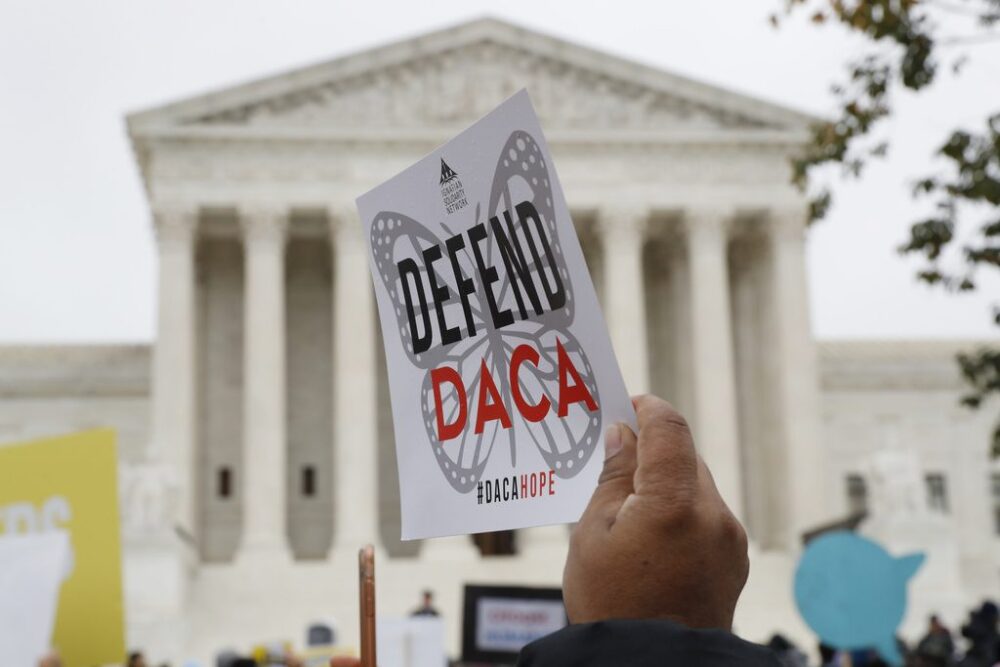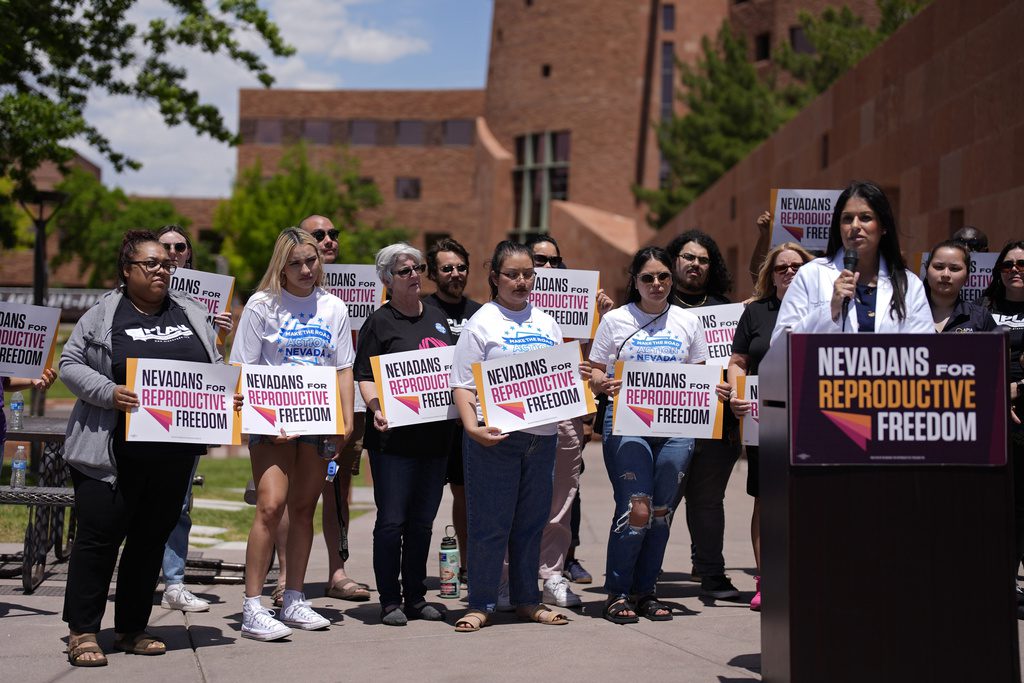
(Foto AP/Jacquelyn Martin)
A UNLV law professor lays out what’s at stake and shares his fears that families will be separated and entire communities put at risk in Trump’s second term.
President-elect Donald Trump’s first term brought “a lot of psychological warfare” for immigrant families in Nevada and across the country, according to UNLV law professor Michael Kagan.
Trump instituted a Muslim ban, tried to end the Deferred Action for Childhood Arrivals and other temporary legal protection programs, separated families seeking asylum, and fought to build a wall at the US-Mexico border. Kagan said the anti-immigrant policies also materialized in an “invisible wall” — barriers such as delays and backlogs in the immigration system.
“I think people got exhausted by worrying about this on a constant basis,” Kagan said. “Trump’s first attack on immigrants was primarily a psychological attack. There were people I know who had their families torn apart and have empty seats at the kitchen table as a result.”
Kagan — who is also director of the UNLV Immigration Clinic, which offers free legal services to detained adults and unaccompanied children against deportation — fears that a second Trump term could be even worse when it comes to immigration policies.
Trump has promised to deport every undocumented immigrant in the country in “bloody” fashion — a policy that would have staggering consequences for families, communities, and the economy.
The Pew Research Center estimates there are 11 million undocumented immigrants living in the US, and almost 70% of these households are considered “mixed status,” meaning they also live with lawful immigrants or US-born residents. Kagan fears that mixed status families are at risk of being separated and pulled apart by predatory immigration policies, even as many noncitizens have lived in the country for decades, built families, worked and paid taxes, and become integral parts of communities.
“Mixed families — meaning that within the same family, you have an undocumented parent, a parent with status or citizenship, you have kids, maybe the oldest kid is undocumented or has DACA, the youngest kids might be US citizens — this is a typical Las Vegas family,” Kagan said. “Because of my job, I’ve had to sit with people who’ve had their mom or their dad deported, and the tone of it is basically the same as talking to someone who’s recently had an intimate family member die. We’re talking about someone who was a daily constant part of your life and now suddenly missing.”
Kagan notes that people might argue that technology such as video calls can heal the distance, but that’s not the case.
“When you’re talking about this is the person who picked me up at school, this is the person who helped me with my math homework, this is the person who made dinner, and now they’re just gone. That is devastating on a human level,” Kagan said.
One of Kagan’s biggest worries is that Trump will attempt to carry out the policies he was unable to pursue the first time around because of the overall inefficiency of his administration as well as COVID-19 pandemic and litigation, which slowed down immigration proceedings.
“It was a really precarious roller coaster ride for everyone involved in immigration, first and foremost for immigrants and people in their families who are directly impacted by federal policy. And definitely for anyone who’s trying to practice immigration law,” Kagan said. “Back during the Trump administration, there used to be jokes about needing to check Twitter to find out what the laws are today. And the thing is, there was a lot of reality to that, because new memos or policies would be issued so fast that even standard electronic legal research tools like LexisNexis, or Westlaw weren’t actually fast enough.”
Now, a coalition of conservative groups led by the far-right Heritage Foundation have crafted a brutal anti-immigration agenda as part of Project 2025, a 900-page blueprint for Trump’s second term. The plan isn’t new, Kagan said, but double downs on what Trump’s first administration already attempted or started to carry out before his term ended.
“You don’t need to read Project 2025. Most of what is in there are things that either the Trump administration already tried to do in its first term, but sometimes wasn’t able to carry out to fruition, or things that Trump has himself talked about in interviews,” Kagan said. “You can pretty much listen to what Trump says and look at what he already did while in office, just to get a sense of what might come next. I don’t want to seem to make a certain prediction — the outcomes range from making the current system more harsh in some significant ways, but probably short of a reign of terror.”
Threats from the past still looms
Kagan fears that because some believe Trump’s four years in office didn’t directly affect them, they view it as a “boy who cried wolf situation,” and might not be as weary as before. But Kagan advises that “real threats [are] still looming” and to remain vigilant.
“People might feel like, ‘Oh, I know what this guy will do,’” he said. “None of us know for sure, but when we look at the range of things that could happen, he is talking about some things that would be a reign of terror for much of our community.”
There are two variables that will determine the impact of another Trump term on immigrants, Kagan said: what the policies say on paper and what resources the administration has to carry them out.
Kagan is concerned that new policies focused on dismantling Temporary Protected Status (TPS) and the Deferred Action on Childhood Arrivals (DACA), which allow certain undocumented people to work and live in the US, would make thousands more people suddenly vulnerable to being deported by US Immigrations and Customs Enforcement (ICE).
He is also concerned that Trump would expand the use of expedited removal, a method already used by border officials to deport an unauthorized immigrant without allowing them to speak to an attorney or have a hearing before an immigration judge, like he did in 2019, when ICE carried out several search warrants at job sites and arrested hundreds — potentially thousands — of undocumented workers.
“People don’t remember this … They never got to carry it out [fully] because COVID really scaled back immigration enforcement in the last year of the Trump administration,” Kagan said. “But expedited removal expansion into places like Las Vegas was one of the things that was teed up for 2020, had the virus not hit us instead.”
The expansion of expedited removals into cities would have allowed ICE officers to stop anyone at their discretion and forced them to prove that they have been in the US for more than two years or risk deportation.
“And let’s be really frank, it’s not going to happen to people named Mike Kagan with blue eyes,” he said.
In a second Trump term, the question of how a renewed expedited removal process would affect immigrants in Nevada would depend on whether Republican Gov. Joe Lombardo authorized the mobilization of the National Guard to aid ICE to enforce such immigration laws to carry out a mass deportation.
“I think the question is, would Lombardo authorize the use of the Nevada National Guard to do this as an ally of Trump? And then there’s a question, sort of a big legal question mark, could the National Guard from another state — like say, Texas — could they be sent into another state?” Kagan said. “If you check yes to all of these, that’s where we get the most extreme forms.”
According to the Migration Policy Institute (MPI), a nonpartisan research organization, an estimated 168,000 undocumented immigrants call Nevada home, 19% of whom are employed in the hospitality and food service industry, and 13% of whom are in construction.
If every undocumented worker in the state was deported, it would rob Nevada of at least 7% of its current job holders, which would have massive ripple effects for employers and local governments.
“If you take one in 10 workers out of the economy, we are going to have massive inefficiency and massive drops in productivity and drops in tax revenue,” Kagan said. “That’s also the labor that we want. And so looking at those things, to me, are more frivolous than just the human effect. But they’re real. And that will mean less money for all of us, more frustration for all of us, and would be terrible for our state financially, for the smooth running of the economy. Many of our biggest industries could not function without immigrant workers.”
“And so even if you don’t care about the impact on people’s families, and I hope that people do, you ought to care that it’s going to be harder to get your meal at a restaurant, it’s going to be harder to get a house built. There’ll be fewer people buying cars, and that’s money going into our schools, it affects all of us.”
This story was updated on Nov. 12 at 10 a.m. to reflect the election’s results.

La senadora Jacky Rosen logra conservar su escaño en reñida contienda electoral
Tras los resultados más recientes tabulados el jueves por la mañana, varios medios dieron a conocer que la contienda entre la actual senadora...

Race for Nevada US Senate seat called for Jacky Rosen by multiple outlets
Following the newest results tabulated Thursday morning, the race between Nevada Democratic incumbent US Sen. Jacky Rosen and Republican Sam Brown...

Un análisis de los resultados de las elecciones de 2024 en Nevada
Si bien Donald Trump ganó la presidencia y parece estar en camino de ganar en Nevada, su éxito no se traduce tanto para los republicanos que...

Harris says nation must accept election results while urging supporters to keep fighting
Harris delivered her remarks at Howard University, her alma mater and one of the country's most prominent historically Black schools, in the same...

Election fatigue? Here’s how to recharge your mental health
We all have our personal struggles in life, from work stress to relationship drama, but something about the 2024 election season simply felt...

Breaking down the 2024 election results in Nevada
While Donald Trump won the presidency and appears to be on track to winning Nevada, his success isn’t translating as much for down-ballot...





